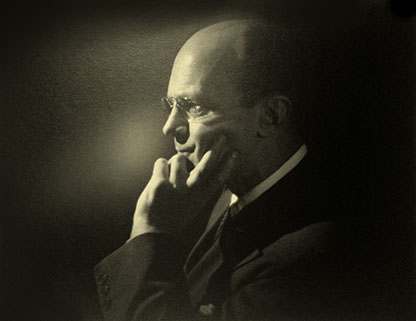 DEEMS TAYLOR
DEEMS TAYLOR
Deems Taylor One of the best-known musical figures of the first half of the twentieth century, Deems Taylor was a composer, radio commentator, music critic, and author. He was the composer of The King’s Henchman, the first American opera ever commissioned by the Metropolitan Opera, with libretto by Edna St. Vincent Millay. His second opera, Peter Ibbetson, was performed 22 times at the Metropolitan Opera in New York, landing Taylor on the cover of Time magazine, and was in the repertoire for several years. Both operas actually made money for the Met. He wrote two other operas, a number of orchestral pieces, including the often played Through the Looking Glass Suite, and hundreds of chorale pieces.
In the 1930s he became a nationally known radio personality, the voice of the New York Philharmonic, and appeared as a guest on many programs. He was known as “the man who brought classical music to the American people” through his radio commentaries, and was often introduced as “The Dean of American Music.” He belonged to the Algonquin Round Table. He wrote several bestselling books, mostly on music (Of Men and Music went into thirteen printings). He was the fourth President of ASCAP. Today he is probably best known as the narrator of the original version of Disney’s classic film Fantasia. Composer William Schumann summed up his wide array of accomplishments: “He was a man for all reasons.”
He thought of himself primarily as a composer, and told one interviewer: “I’ll stay in radio until I’m thrown out, and I’ll keep on writing music because I can’t help it.” But after World War II his style of music fell quickly out of favor. Although he was a supporter of “modern” music, his own compositions were melodic and tonal – everything that the generation of Boulez, Stockhausen, and Cage violently rejected.*
Steve Schwartz , in his review of James Pegolotti’s Deems Taylor: A Biography, sums it up:
“He began and ended as an Impressionist-cum-Neoromantic, more or less Modern when he began, hopelessly old-hat when he finished… However, at the remove of forty years, these changes in fashion matter less and less. Taylor’s music is well-made and almost always inspired, and from what I can tell, audiences like it.”
Similarly, John Rockwell, in his review of the same book, comments:
“Still, pendulums swing back and forth, and in our time of neo-tonality and neo-Romanticism, will we rediscover Taylor’s music? …some of his scores have charm, and might conceivably re-establish him as a minor master.”
Towards the end of his life Deems, referring to how his music had gone out of fashion, said that he was going to put it all in a box labeled: “To be opened
50 years after my death.” He died in 1966, at the age of 80, and thus 2016 is indeed, the 50th anniversary of his death. It seems appropriate to release this previously unrecorded piece at this time.
Three Century Suite was composed in the late 1940s, and completed in its current form in 1950. The piece was only performed once, in 1961, and never published. This performance is based on the handwritten score which is located in the Deems Taylor archives at the Yale Music Library
Deems Taylor is indeed a minor master — a master of orchestration, form, contrast, balance, texture, not to mention melody and harmony — and Three Century Suite is one of his minor masterpieces.
* It is not surprising that after World War II there was a shift in music. Post Auschwitz and Hiroshima, anger and destructive energy directed against tradition is understandable. In rejecting the past, composers like Boulez, Stockhausen, and many others, wanted to throw out everything and “start from scratch”. Thus, they rejected meter, form, tonal harmony, all the traditional building blocks of Western music.
Boulez in particular wrote polemical articles attacking “Romanticism” and “attachment to tradition”. In writing about one of his early pieces, he recalled: “I tried to destroy the first-movement sonata form… [and] demolish fugal and canonic form… the destruction of all these classical moulds was quite deliberate.”
Clearly this mentality would have no use for Deems Taylor’s music. And indeed, in the 1950s, his prominence on the musical scene faded from its once lofty heights. But in the quest for “something new”, is it really necessary to destroy what went before?
© NAVONA RECORDS LLC. ALL RIGHTS RESERVED.
Navona Records offers listeners a fresh taste of today's leading innovators in orchestral, chamber, instrumental, and experimental music as well as prime pieces of classic repertoire. Our music is meticulously performed by the finest musicians and handpicked to ensure the most rewarding listening experience.
223 Lafayette Road
North Hampton NH 03862
PRESS INQUIRIES
press (at) parmarecordings.com
603.758.1718 x 151